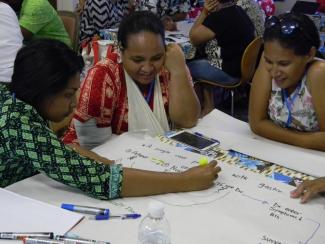
The World Health Organisation declared International Day of Epidemic Preparedness in 2020 to create awareness around the importance of the prevention, preparedness, and partnership against epidemics especially during this COVID-19 pandemic.
Playing a strong role as the Focal Point of the Pacific Public Health Surveillance Network (PPHSN), the Pacific Community’s (SPC) Public Health Division and its Surveillance, Preparedness and Response Programme (SPRP) continues its commitment to the promotion of public health and improving public health surveillance and response to epidemic and other health emergencies in the Pacific.
The ongoing work has been made possible with financial support from the Agence Française de Développement (AFD), the Australian Department of Foreign Affairs and Trade (DFAT), the European Union (EU) and the U.S. Centers for Disease Control and Prevention.
Strengthening Pacific Island Countries and Territories (PICTs) health information systems (HIS) and capabilities in surveillance and epidemiology are among the key areas of focus of PPHSN, in particular that of the Strengthening Health Interventions in the Pacific – Data for Decision-Making (SHIP-DDM) programme, one of the 6 support service networks of PPHSN.
Since August 2013, more than 340 health professionals in 15 PICTs have benefitted from SHIP-DDM programme, an accredited course by the Fiji National University (FNU).
Mele Tinalasa Vunipola from the Tonga Ministry of Health Public Health Division was among those who had successfully completed all 5 modules of the Post Graduate Certificate in Field Epidemiology (PGCFE) course shared her thoughts on this. “This training has enabled me to conduct self-assessment of the Ministry of Health’s health information system, map data flow and identify challenges and system gaps. I was also able to gain an insightful notion on how our Ministry’s information system works and where I fit in and my contribution to the system. I utilized what I learned from the PGCFE training to revise our data collection tools, improve on our method of data analysis”.
In addition to this, Pacific laboratories have been upskilled on Laboratory Quality Management System (LQMS) and were trained on shipment of infectious substances. A recently held virtual training of trainers that was held in September 2021 provided 17 PICT participants the opportunity to renew their training of trainer’s certificates, allowing them to co-facilitate in in-country shippers of infectious substance training.
George Junior Pakoa, Manager Dental and Allied Health Services of Vila Central Hospital in Vanuatu said, “This training will assist the country during the COVID-19 pandemic and is an opportunity to have our shippers certified by a certified local trainer. This will enable certified shippers to send blood samples or any samples of human or animals’ origin to any reference laboratories overseas for further confirmation.”
Jojo Merilles, Epidemiologist - Project Coordinator and Acting Team Leader for SPRP said while SPC has been supporting PPHSN and its members for the past 25 years to strengthen surveillance, preparedness and response, COVID-19 has deepened the imperative to expand beyond the existing service networks and mechanisms of surveillance and epidemic preparedness to manage and control health emergencies.
“Over the past years we have set up epidemic intelligence systems to detect and monitor emerging public health threats and we produce weekly reports on epidemic and emerging disease alerts in the Pacific.”
SPC will continue to collaborate with partners and donors to further strengthen capacity of health service providers, while maintaining and creating robust tools and systems for surveillance and epidemiology that will allow timely interventions, informed decision-making and better preparedness and response
